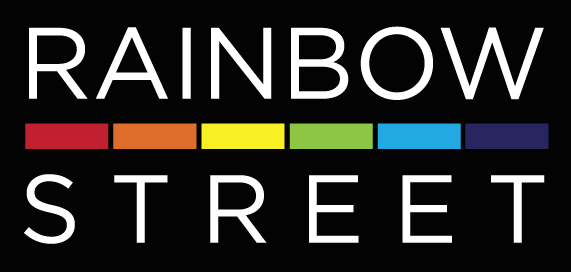Queer in Context: A Trans Person's Story
/As an organization that supports queer and trans* people representing many different kinds of personal identities, Rainbow Street is honored to share Simon’s personal narrative about their experience navigating the cultural paradox of trans-ness in Arab society. Rainbow Street envisions a world in which our mission of supporting queer and trans* people living in crisis in the Arab World becomes obsolete. Until that time, sharing stories like Simon’s is among the most powerful tools for creating a global community of support.
Simon, a twenty-one year old trans* person, is an Arab-American living in the San Francisco Bay Area. They have spent a considerable amount of time abroad in Bahrain, Jordan, and the Palestinian Territories. Simon grew up in the United Arab Emirates, but was born in Southern California and spent their summers there. Simon came out in 2011 when they began their transition, and has lived in California since 2004.
“After I came out in 2011, I went to visit my dad in Bahrain. At this time, I had an eyebrow piercing, short hair. I was pretty androgynous looking. My dad didn’t really care, but my grandmother did. My dad’s side of the family didn’t know I was trans*,” Simon explains.
NOTE: Trans* signifies within text, an acknowledgement of myriad identities.
Simon further recounts an experience with their dad in Bahrain. “That year is when I came out to my dad. He told me he was going to take me to a tailor to get custom button down shirts—they don’t really make nice men’s shirts for the curvy, estrogen dominant people of the world. The people at the tailors kept saying they needed to make the male styled dress shirts in a style for a lady. They seemed confused. They kept saying lady, lady, lady. I just kept seeing it written all over the order form. Lady, lady, lady.”
Simon recalls the thoughts in their head. “I am not female.”
As a child living in the UAE, they remember underlying yet prominent moments that forced them to live as a gender they did not identify with. These were memories that reminded them on a daily basis of how they were supposed to think—what they were supposed to wear, what they were supposed to do.
“Cis-ness, trans-ness, straightness, and queerness are socially constructed and do not hold to the same conventions universally, but the prejudice tends to unfold in the same ways.”
Simon felt at odds with their heavily gendered upbringing from a young age. They remember a lack of support as well as a feeling of isolation and alienation. This was compounded by the school system they grew up in where students were separated by gender.
They remember the words of their peers. “Just shut up, no one cares what you have to say. Be quiet.”
“I am erased in most spaces,” Simon expresses.
Simon believes their gender identification development and exploration was slowed by an early hatred against men due to gender expectations in the countries they grew up in. They think they would have come out as trans* sooner if it was not for the prevalence of sexual harassment against women and girls in the Middle East.
“In the United States men catcall women, ask them to smile out of nowhere, get pissed at
women when they reject them. But when I lived in the UAE, harassment took the form of young men slapping the butts of older women as they biked past them and little boys peeking under the skirts of older women. I vitriolically hated men for a very long time because of this.”
Simon felt coming out to their family was more difficult because they waited to explore their gender identity until they were a later age. Their immediate family, while now supportive, also resisted Simon’s gender identification heavily at first because they feared Simon would have a difficult life. They also had trouble embracing the news because of a resistance to “unnecessary medical surgery.”
“Islam prohibits non-medical body modification. Most people in the Arab world are Muslim so they are likely to [follow] this. Trans people are associated with surgeries and body modifications and therefore lumped in with this prohibition. I would argue that transgender surgery and hormones are medically necessary and not cosmetic. This is very hard for people of any culture to understand.”
Simon doesn’t see that the reliance on traditional gender roles found within Islamic and Middle Eastern culture affect trans* people in the Arab world any more than the constructed gender roles of the United States.
“These countries, these people, are in a totally different cultural context than we are. Their queer liberation isn’t going to look like our queer liberation.”
“Cis-ness, trans-ness, straightness, and queerness are socially constructed and do not hold to the same conventions universally, but the prejudice tends to unfold in the same ways.”
They also believe the general criticism of the LGBTQIA policies in Arab countries in the media—both inside of and outside of LGBTQIA groups—can be negative. “These countries, these people, are in a totally different cultural context than we are. Their queer liberation isn’t going to look like our queer liberation.”
This viewpoint doesn’t excuse homophobia, transphobia, or laws and policies that are anti-queer, but it does force the typical mainstream media consumer to consider the impacts of colonialism, eurocentrism, and cultural dichotomy. It causes the typical individual to think of other faces in the struggle for rights.
To Simon, and many others, it is more important to open a general discussion about the lives and peoplehood of queer and trans* people than to simply focus on the persecutions in the counties that they come from.
“When you discuss the problems in a country without discussing the people in a country, you’re creating an ‘others’ population. You’re not allowing those people to have representation of their own. That creates a lot of alienation and not a lot of progress.”


